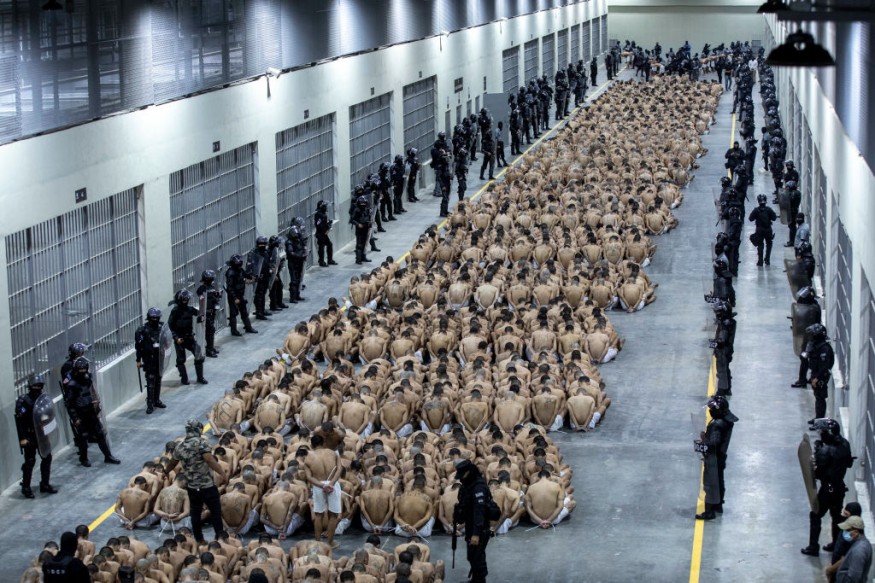El Salvador Congress Agrees to Mass Trial for Thousands Jailed in Gang Crackdown

The El Salvador congress passed new rules on Wednesday to expedite the judicial process for accused gang members through mass trials, AP reports.
These changes to the country's criminal code represent the latest measures in President Nayib Bukele's ongoing crackdown on street gangs, particularly Barrio 18 and Mara Salvatrucha (MS-13), which he initiated last year in response to escalating violence.
During this anti-gang campaign, the government took unprecedented steps by declaring a "state of emergency," leading to the suspension of constitutional rights. As a result, a significant number of individuals, totaling 71,976, were detained under suspicion of gang affiliation.
Remarkably, this amounts to approximately 1% of the country's population.
However, this aggressive approach has raised concerns about potential human rights violations, as the detention facilities have become overcrowded, exacerbating the situation.
According to estimates by the human rights group Cristosal, only around 30% of those detained have clear ties to organized crime, further fueling criticism of the government's tactics.
Under the newly passed rules, courts can conduct trials for groups of defendants based on specific criteria, such as the geographical area they lived in and the particular "clique" or smaller group within a gang that controlled that territory.
READ NEXT : El Salvador Opens Mega Prison
El Salvador Has Arrested 71,900 Alleged Gang Members
El Salvador has been operating under a state of emergency for a lengthy period of 16 months, during which more than 71,900 individuals suspected to be members of gangs have been arrested.
Official data indicate that approximately 6,000 people have been released during this time, per Al Jazeera.
The measure to detain alleged gang members through the state of emergency was passed with significant support from legislators belonging to President Nayib Bukele's New Ideas party, which holds a majority in Congress.
The objective behind this move is to enhance order and efficiency in tackling the gang-related issues that the country has been facing. The measure received 67 votes in favor and only six against.
According to Justice Minister Gustavo Villatoro, the new rules now allow the prosecution of up to 900 defendants from the same group simultaneously.
This indicates a concerted effort to expedite the legal process and handle a large number of cases more efficiently.
Supporters of the state of emergency argue that it has yielded positive outcomes, citing a noticeable decline in homicides and crimes like extortion and drug dealing.
However, the policy has not been without its share of criticisms from both domestic and international human rights groups.
Critics have raised concerns over alleged human rights abuses, including reports of torture, deaths in custody, and arbitrary detentions, particularly among young men in poor neighborhoods.
Opposition Is Still Skeptical About the New Rules
Despite the lawmakers' assurance that individuals found not to have links to gangs should be released, opposition politicians and rights groups remain skeptical about the recent measure allowing group trials for accused gang members.
They argue that such trials risk depriving detainees of their right to due process and individual presumption of innocence, according to Reuters.
Manuel Melendez, a researcher on Salvadoran politics from Harvard University, pointed out the evolution of the government's stance: from initially claiming that innocent people weren't being arrested to admitting their detention but promising eventual release by the courts.
Ingrid Escobar, spokesperson for Humanitarian Legal Aid, a group helping Salvadoran detainees, expressed concerns that prisoners might face trials for crimes they did not commit.
She highlighted the risk faced by those living in neighborhoods stigmatized by gangs, even if they are not actual gang members.
The situation has drawn international attention and criticism.
During a hearing at the Inter-American Commission on Human Rights on July 14, rights organizations denounced 174 deaths in state custody and documented over 6,400 human rights abuses during the state of emergency.
In response, the government and the attorney general's office have denied these allegations.
Lawmakers also approved a bill that raises the maximum sentence for gang leaders from 45 to 60 years, reflecting the government's continuing efforts to combat gang-related activities.
READ MORE : Ecuador President Declares State of Emergency
This article is owned by Latin Post.
Written by: Bert Hoover
WATCH: Inside El Salvador's gang crackdown - From BBC News
Subscribe to Latin Post!
Sign up for our free newsletter for the Latest coverage!
© 2026 Latin Post. All rights reserved. Do not reproduce without permission.















